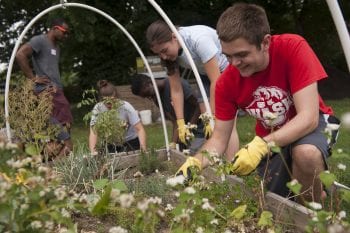This post is brought to you by Katy Przybylski, vice president of campus and community outreach at the WashU Women’s Panhellenic Association.
A staggering thirty percent of Washington University in St. Louis’s undergraduate population is a member of a fraternity or sorority. And there is strength in those numbers. On Saturday, September 26th, 250 volunteers from Washington University’s Greek community came together for a day of hands-on service at fifteen different sites throughout the St. Louis area.
I currently serve as the Vice President of Philanthropy and Community Service for Washington University’s Women’s Panhellenic Association, the governing body of the sororities. Along with assistance and moral support from my Interfraternity Council partner, Bradley Schleslinger, and our advisor, David Stetter, I’d been planning this Greek Day of Service for about six months.
The idea for Greek Day of Service formed for many reasons, but the main impetus of the project was to highlight the service potential of our Greek community. Fraternities and sororities are often criticized for their passive approach to philanthropy, with a focus on raising money rather than participating in service projects.
This is a critique that I struggle with myself. On one hand, I understand that a solely fiscally centered approach to giving back distances our Greek community from the St. Louis community. However, I do still believe that raising money is incredibly important for each chapter to continue to make a considerable contribution for their national philanthropies.
That being said, I think the problem is not that we need to shift our conception of philanthropy to be hands-on, but rather, to encourage community service projects alongside fundraising. And many organizations already do so. Fraternity members of Alpha Delta Phi provide tutoring services twice a week to students in the Ferguson community. Sorority members of Delta Gamma teach aerobics classes, play games, and help organize a Christmas tree lot at the Delta Gamma Center for Children with Visual Impairments. Other organizations have painted bleachers at schools, built plant beds for churches, and volunteered with many other projects. Greek Day of Service was merely a way of extending these pre-existing service initiatives on a larger scale to the entire Greek community.
Bradley and I started brainstorming for the project in April, with much help from leaders in the Gephardt Institute of Civic and Community Engagement and the Office of Government and Community Relations and partial funding from Student Union’s Engage360. Initially, advice from past large-scale service project leaders was supportive but skeptical, and rightfully so. We wanted this day to be one of the biggest service initiatives our Greek community had experienced, and we had our work cut out for us. We spent the summer reaching out to potential sites with countless e-mails and voicemails and visits, ending up with a total of fifteen different projects for our Saturday afternoon of service.
On 9AM on Saturday 26th, approximately 250 Greek students piled into Tisch Commons for breakfast before they departed on buses for their sites. Each group consisted of 10-25 members of different organizations, led by members of Panhellenic Executive Board, Interfraternity Council, and chapter philanthropy chairs. Their projects included: visits with senior citizens at a senior living home, working at Hope Lodge, the American Cancer Society’s housing facilities for cancer patients, gardening with non-profit beautification and sustainability organizations UCity in Bloom and Gateway Greening, and outdoor cleaning at six different St. Louis Public Schools.
Additionally, students from the Greek community served as tour guides and panel leaders for nearly 100 KIPP Victory and KIPP Wisdom Kindergartners and their families as they took a field trip to a college campus for the first time. At KIPP, or the Knowledge is Power Program, students are told they are expected to attend college from their first day of school. Anne Barton-Veenkant, Manager of Student and Family Support at KIPP Wisdom, later reported that many KIPP scholars on the bus exclaimed, “I love college!” and parents shared feelings of nostalgia for their school days.
Although I was on campus on-and-off the phone every other minute coordinating buses, leaders, and tools for each site, I got the pleasure of seeing the volunteers’ faces as they returned to campus after 3 hours of hands-on service: exhausted, fulfilled, and ready to refuel with Domino’s pizza. Abbey Maxbauer, a member of Kappa Delta, shared her experience during the day: “I was at Patrick Henry Elementary, gardening outside in a garden used for educational purposes that was so grown over the sidewalks couldn’t be seen. By the end, it looked like a completely different place. It was incredibly rewarding to be able to actually see what a difference my group made.”
I think the greatest moment of Greek Day of Service, however, was talking to Lisa Williams, Facilities Manager for St. Louis Public Schools, later that day. Lisa helped organize outdoor beautification projects at six St. Louis public schools. “This is the best before and after project I’ve ever seen,” Lisa said. “I wish I could take a picture of each principals reaction when they see the work that you all did.”
750 hours of service and immeasurable impacts later, I am confident the spirit of service is alive and well in our Greek community and that Greek Day of Service is the first of many projects of its kind.
